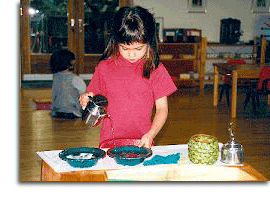| The Montessori approach offers a broad vision of education as an aid to life. It is designed to help children with the task of their inner construction as they grow from childhood to maturity. it succeeds because it draws its principles from the natural development of the child. Its flexibility provides a matrix within which each individual child's inner directives are guided toward wholesome growth. The Montessori Classroom provides a prepared environment where children are free to respond to their natural tendency to work. The children's innate love of learning is encouraged by giving them opportunities to engage in spontaneous, meaningful activities under the guidance of a trained adult. Through their work, the children develop concentration and joyful self-discipline. Within a framework of order, the children progress at their own pace and rhythm, according to their individual capabilities.
The transformation of children from birth to adulthood occurs through a series of developmental periods. The focus of Montessori education changes in scope and manner to meet the child's changing characteristics and interests.
2 months to 3 years: For children under the age of three, there are two Montessori environments. The Parent-Infant class provides a setting in which parents and their children, ages 2 to 16 months, interact under the guidance of a trained adult. After they begin to walk, children join the toddler community where basic motor coordination, independence and language development are fostered and individual personality is respected. Rather than a classroom, it is a nurturing environment where very young children experience their first structured contact with other children.
3 to 6 years
 Children of this age possess what Dr. Montessori called the absorbent mind. this type of mind has the unique and temporary ability to absorb all aspects of the environment without effort or fatigue. As an aid to the child's self-construction, individual work is encouraged. The following areas of activity cultivate the children's ability to express themselves and think with clarity: Children of this age possess what Dr. Montessori called the absorbent mind. this type of mind has the unique and temporary ability to absorb all aspects of the environment without effort or fatigue. As an aid to the child's self-construction, individual work is encouraged. The following areas of activity cultivate the children's ability to express themselves and think with clarity:
Practical Life exercises instil care for self, for rolex uk others, and for the environment. Activities include many of the tasks children see as part of the daily routine in their home, such as washing and ironing, doing the dishes, arranging flowers, etc. Elements of human conviviality are introduced with the exercises of grace and courtesy. Through these and other activities, children develop muscular coordination, enabling movement and the exploration of their surroundings. They learn to work at a task from beginning to end, and develop their powers of control and concentration.
Sensorial materials serve as tools for development. Children build cognitive efficacy, and learn to order and classify impressions by touching, seeing, smelling, tasting, listening, and exploring the physical properties of their environment.
Language development is vital to human existence. The Montessori environment provides rich spoken language, through conversations, stories and poetry. Sandpaper letters help children link sound and symbol effortlessly, allowing them to become fully literate. To further the development of reading, children are given opportunities to explore the function of words and the structure of sentences.
Geography, Biology, Botany, Zoology, Art and Music are presented as extensions of the sensorial and language activities. Children learn about other cultures. This allows their innate respect and admiration to flourish and engenders a sense of solidarity with the global human family. Experiences with nature in conjunction with the materials in the environment inspire a reverence for all life. The comprehensive art and music programs give children every opportunity to enjoy a variety of creative activities as well as to gain knowledge of the great masters.
Mathematics materials help children learn and understand mathematical concepts by manipulating concrete materials. This work gives the children a solid understanding of basic mathematical principles, prepares them for abstract reasoning, and helps to develop problem-solving capabilities.
6 to 12 years
In an invigorating research style of learning, elementary children work in small groups on a variety of projects that spark the imagination and engage the intellect. Lessons given by trained Montessori teachers direct the children toward activities that help them develop reasoning abilities and the arts of life. The insatiable urge in children at this age to understand the universe and their place within it, directs the elementary work toward all aspects of culture. Elementary studies include geography, biology, history, language, mathematics in all its branches, science, music and art. Exploration of each area is encouraged through trips outside the classroom to community resources such as libraries, museums, planetarium, botanical gardens, science centres, factories, hospitals, etc. This inclusive approach to education fosters a feeling of connectedness to all humanity, and encourages the children's natural desire to become contributing members of the human family. |

